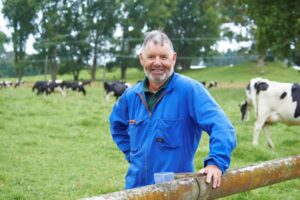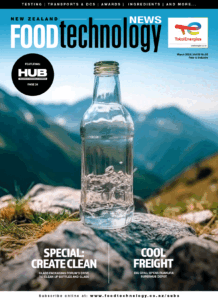
Waikato dairy farmer and Climate Change Ambassador George Moss
New Zealand dairy farmers have been labelled as having the world’s lowest carbon footprint.
An AgResearch analysis released yesterday confirms New Zealand has an on-farm carbon footprint 46% less than the average of the 18 countries studied.
Commissioned by DairyNZ, the study was independently produced by AgResearch and peer-reviewed by an international specialist in Ireland.
New Zealand was found to be the most efficient producer at 0.74kg CO2e per kg FPCM (fat and protein corrected milk) – must lower than the average of 1.37kg CO2e per kg FPCM of the other countries.
DairyNZ chief executive Dr Tim Mackle says the research plays a key part in understanding how New Zealand dairy farms stack up and informs how our farms can be even more efficient.
“New Zealand’s dairy sector is committed to remaining the most efficient producer of low emissions milk in the world,” says Mackle.
“Our focus as a sector is sustaining our success as consumers and communities increasingly seek sustainably produced food.
“New Zealand dairy farmers’ hard work and investment over decades has contributed to this world-leading status. Our grass-based, outdoor grazing system is unique globally and is critical to our success.”
“Because we are already so efficient, there is no silver bullet to even greater efficiency. Significant investment in research and development is needed to find solutions.
“Our sector is committed and has research underway. We need Government support as we adopt new knowledge, practices and technology.”
The research compares carbon dioxide equivalent (CO2e) emissions per kilogram of milk (fat and protein corrected milk – the nutritional content recognised in the study as CO2e per kg FPCM) – an internationally recognised method.
Waikato dairy farmer and Climate Change Ambassador George Moss says pasture-based farming and genetic improvement are important components of success.
“Grass-fed farms and sophisticated animal breeding are key components to our low carbon footprint but there is more we need to do as we play our part in addressing climate change,” says Moss.
“We are world-leading at emissions efficient milk production, but we must continue to adapt and adopt new technology and knowledge. Our global competitors are never far behind, plus we know it is the right thing to do for our environment, our consumers and humanity as a whole.”


































































































